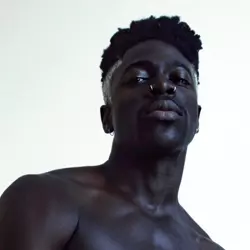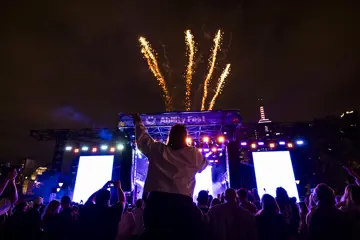 Moses Sumney
Moses SumneyWhen Moses Sumney was ten years old, his life completely changed. He'd grown up in San Bernardino, in the 'Inland Empire' east of Los Angeles, but suddenly his parents — both members of the clergy — wanted to return to Ghana, to "contribute more to the society that they came from". Sumney was transplanted to Accra; a "really insular child, very shy and very quiet", suddenly thrown into another world.
"It was really intense, and difficult," says 26-year-old Sumney. "The cultural shock, the cultural change. I was a very American kid, and then suddenly I was living in Africa. Different accents, different cultural norms, different education system. I truly never [acclimatised], and I lived there for six years."
It was as a 12-year-old, riding the bus in Accra, that he started writing songs. "I didn't know how to play any instruments, so I would write them all a cappella; just remember the melodies. And, had a notebook full of songs without instrumentation; but I could hear the instrumentation in my head," he recounts. "I always knew I wanted to be a musician. It was the only thing I wanted to do, the only thing I fantasised about every hour of every day."
"[I] had a notebook full of songs without instrumentation; but I could hear the instrumentation in my head."
Sumney returned to California to go to college and, while studying creative writing at UCLA, taught himself how to play a guitar and use a loop pedal. "Writing songs without music led me to looping, to creating songs with just the sound of my body," he says; his compositions, still, centred around his voice. He started performing in 2013 and immediately got a hugely positive response, eager A&Rs imagining him as a budding soul singer.
Don't miss a beat with our FREE daily newsletter
"It was very intense and overwhelming, because it all happened very quickly," Sumney offers. "That's the thing about making music in LA, you're just naturally situated within the music industry. I was always into indie music: Jose Gonzalez, Sufjan Stevens, Dirty Projectors — stuff like that. I always envisioned myself as an indie performer, [and] was very naively married to the idea of being an artist; a dark, deep artist. And, the first year or two of me performing, there was a huge discrepancy between how I conceived of myself, and how other people perceived me. I just kept being told over and over how I'd make a great major label musician, a great pop star."
Sumney has had real flirtations with crossover — he appeared in the movie Creed, as part of Tessa Thompson's band, and sang on the latest LPs by Solange and Corinne Bailey Rae — but he's largely stuck to his own path. He's self-released both of his releases, 2014's Mid-City Island and 2016's Lamentations, and tried to make his music "more interesting, and weirder". After two years of work, he's close to finishing his debut LP, due for release in 2017. The record pushes at his limits — "the songs are a little bit longer, the ideas a little bit bigger, things are a little more produced out, there's more instrumentation" — and is about "toying with the idea of genre, or non-genre". At this point in human history, Sumney says, "the lines are just so blurred; people need to get over it if they're attached to genre, or they're attached to the label you're signed to. Classification, in general, is just fading away."
Sumney isn't sure that the album is going to come out under his own name, though. "Every day I go back-and-forth about whether I'm going to change my name; I think I might," he says. He sees too much "cognitive dissonance" between his self-identity and the musical entity that now exists under his birth name. "People think that they own a part of the [artist], or that they're entitled to it," Sumney explains. "People think they know me because I make intimate music, and they don't. It's important for people to understand that: that they can't know me, and that they don't need to know me. As someone who pours my heart and soul into what I do, that's enough of me."
Yet, it's that level of candour that draws listeners devotedly to Sumney's music. "The people who are at my shows are, typically, emotional people. We're all just there to have a cry, and share that moment. People come up to me, crying. Or people post on the internet about how they relate to the songs. It's really intense, actually; I just take the understanding that it's not about me. When I make music and share it with the world, it's not about me, Moses, the person, inside this bag of flesh. It's about something much bigger than me... Being honest and true and raw about our feelings, I think that is what will push us forward as human beings; that is what will push the collective human consciousness forward."















